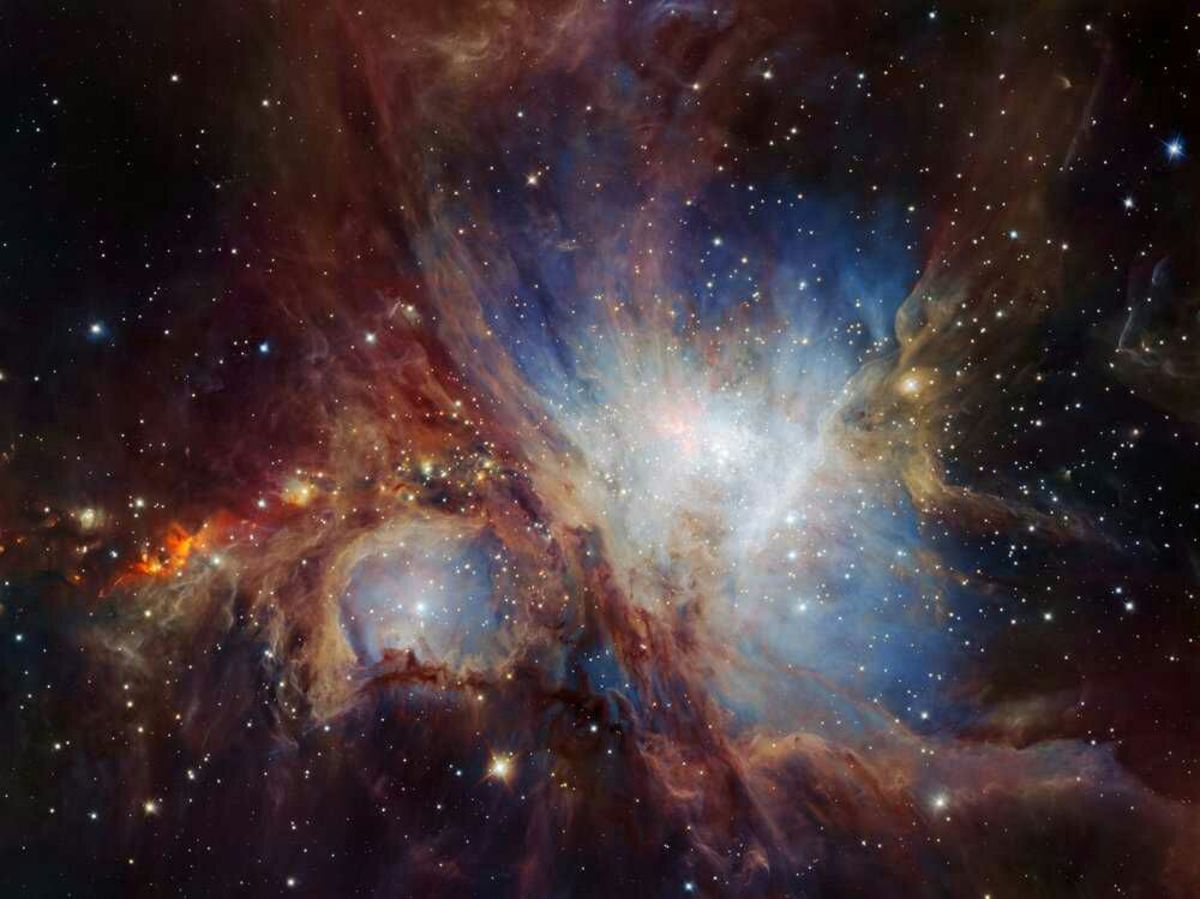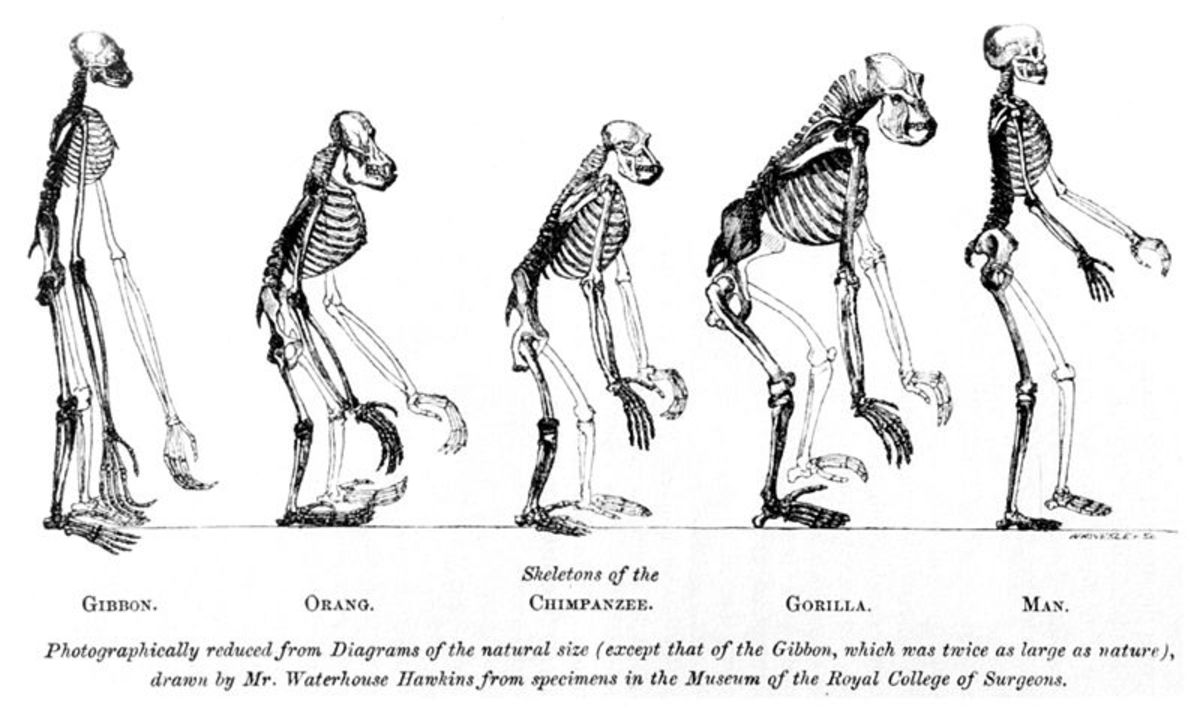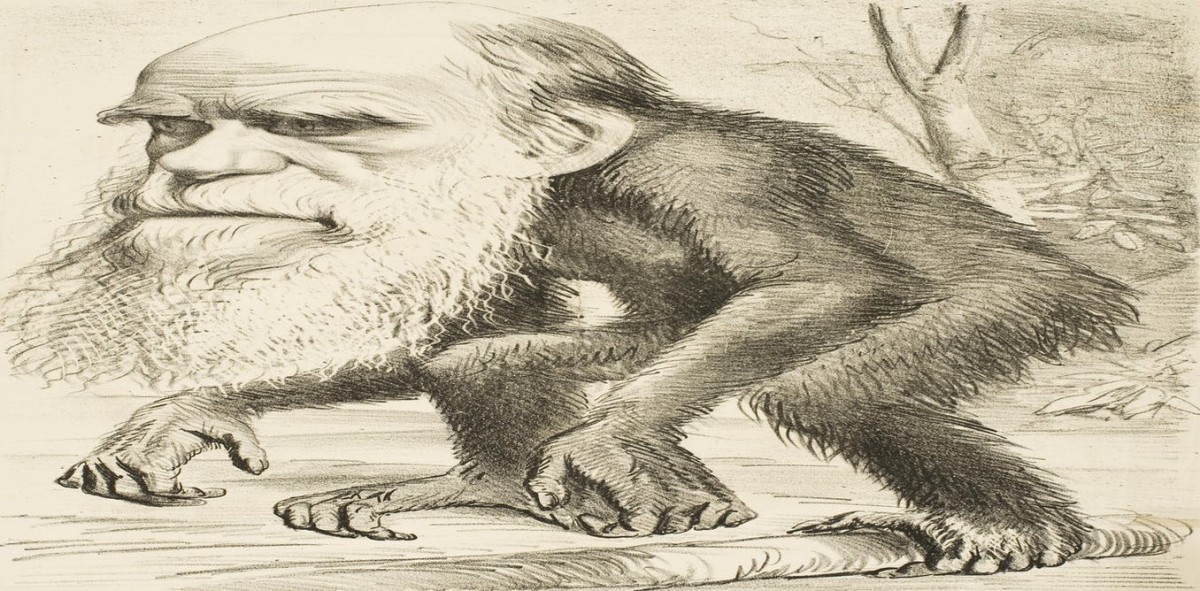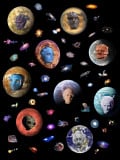Ten Reasons to be a Creationist
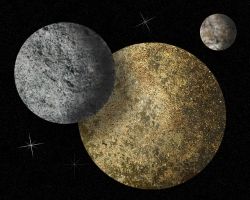
Is There Really Evidence For Creation?
We live in a culture that is heavily saturated with evolutionary thinking, but are you aware that there is powerful evidence for creation all around us? There are many ways to approach the subject of origins but in this article I'll give ten reasons to accept or, at least, consider the creation model of origins.
I can say that I believe in both evolution and creation because I was once an evolutionist until I evolved into a creationist. I was years beyond college when I started to study the subject of origins and began my personal evolution into a creationist. I'll share just a few points that I find interesting. This is an extremely important subject and everyone must decide for themselves where they stand. My objective here is to encourage readers to look at all the data and evaluate the underlying assumptions as the data are discussed. This short article is necessarily limited in scope and information but it's a start.
In this short article there is no way I can give each topic a detailed treatment so I've included links to further reading for those interested.
All images are my creations.
1. The Law of Cause and Effect
In the beginning, God or Hydrogen?
When we consider the laws of cause and effect we can generalize to say that an effect cannot exceed its cause qualitatively or quantitatively. If the first cause of our universe was a distant big bang resulting in an expanding cloud of mostly hydrogen gas, the resulting organized universe and complex life including the human mind exceeds the first cause qualitatively if not quantitatively. The human brain with around 100 connections is perhaps the most complex arrangement of matter in existence. The brain and mind certainly require a qualitatively greater first cause than an explosion. As Dr. Duane Gish once pointed out, the evolutionist must have enough faith to believe that hydrogen is a colorless, odorless gas that, over time, becomes people. Personally, I lack that kind of faith. For more on this subject, see the links below.
Expelled: No intelligence allowed
A great DVD staring Ben Stein reveals the lack of academic freedom when it comes to intelligent design. This video was in theaters when I first saw it. It is relevant, informative and even entertaining.
2. Thermodynamics
It's against the law!
The first and second laws of thermodynamics apply to all domains of science and together contradict the theory of evolution. The FIRST LAW OF THERMODYNAMICS, sometimes called the law of CONSERVATION tells us that the total mass and energy in the universe is fixed and constant. Matter and energy can be converted into one another but the total quantity of matter and energy in the universe does not increase or decrease.
The SECOND LAW OF THERMODYNAMICS describes the relationship between matter and energy and the direction and conditions by which they interact. In simple terms, the second law says that all systems tend toward entropy or a state of less available energy and increasing disorder. We see this in our every day world as we observe that everything around us tends to run down, wear out, break down and die. We can prolong life or function with the input of energy and order (repair a house or vehicle, take medicine, etc.) but in the end, entropy or the second law prevails and everything runs down, wears out, breaks or dies.
When we consider the laws of thermodynamics in the context of our universe, we can see that it didn't create itself because the total mass-energy is fixed. We know it isn't eternal because it is still running down. In accordance with the second law, the ultimate destiny of the universe is heat death. It will still exist but there will be no more available energy for anything to happen. Our universe is running out of energy but it hasn't yet so it had a beginning, it's not eternal.
The concept of evolution with increasing order and complexity runs contrary to the second law of thermodynamics. Things left to themselves run down, wear out, break and die, they don't increase in complexity and functionality. Sometimes evolutionists will claim the earth is an open system because the energy from the sun drives evolution. To refute this, consider a dead cat beside the road. All the chemicals for life are present and the energy of the sun is playing upon it yet it doesn't produce new life. It's an open system but it moves in the inevitable direction of the second law, entropy or disorder increases as complex components break down into their simplest forms and it smells a lot in the process. For more on this subject read this.

3. The Law of Biogenesis
Life always and only comes from life
In all of observed history and in all scientific observation and experimentation, life has always come from pre-existing life. This is sometimes referred to as the law of biogenesis. The theory of evolution maintains that non-life somehow evolved into life but evolutionists are nowhere near explaining this violation of observational and experimental history.
Based on the assumption of evolution and the idea that all organisms are related by intermediate species derived from a single celled original life form, evolutionists have long postulated the phylogenetic tree or tree of life that we have all seen in text books. The tree of life is drawn with the base of the trunk being an unknown first life form and with the tree rising and branching over time as new varieties of plant and animal life evolve. The problem with this tree of life concept is that there's no evidence to support it. Many evolutionists are backing away from it because it's not supported by the fossil record (see below). There are far fewer plant and animal species living today than in the past - this doesn't fit the branching diversifying tree of life concept. Even evolutionists estimate that 99% of all species that ever lived are now extinct. Based on today's observations it is said that a distinct plant or animal species becomes extinct every 20 minutes. Some estimate that by the year 2100, half of all existing species will be extinct. In the present and in the fossil record we see much extinction but we are not seeing the transitional replacement species needed to sustain the theory of evolution. The law of biogenesis holds true, life only comes from life but new and distinct kinds of organisms don't arise from a branching tree or any observed evolutionary mechanism.
Read more on this here.
4. Probability of Life by Evolution
Probably NOT
The mathematics of probability can be applied in many ways in the origins discussion but consider the complex and highly specified and organized nature of biological systems. Complex DNA codes carry information for the creation of proteins by specifying the specific sequence of specific amino acids in the formation of each protein. A small error in the genetic code (mutation) can potentially be fatal to the host organism. That's why the genetic code must be very specific and accurate and why we have "proof reading" molecules that spell check our DNA and make corrections when errors are found. What's the probability of that by random chance? Rather than bore you with a bunch of numbers I will simply state that the origin of life by random chance is impossible given ANY amount of time.
If you would like specific numbers and probabilities, here is an article will find interesting.
5. The Fossil Record
Links are Systematically missing
When most people think of evolution they immediately think of fossils. If their knowledge of the fossil record is limited to "newspaper science" they are impressed with each new find that "proves" some aspect of evolution but they are unaware of the true nature of the record. If Darwinism is true, each existing or extinct organism is the product of gradual incremental changes from some original single cell organism. If this theory were true the fossil record should be filled with transitional fossils showing the evolutionary path of each organism, or at least some organisms, or perhaps one.
In fact the fossil record is characterized by the sudden appearance of distinct and complex organisms, stasis (little significant change) and extinction. The very few claimed transitional fossils are usually highly debatable, even among evolutionists. Sudden appearance of fully formed complex organisms is what the creationist would expect, not what evolutionists would expect of the fossil record. For more on the fossil record, read this.
6. Information Theory
Where did the information come from?
This is a fascinating subject. Information is an intangible product that is transmitted by highly specific complex symbolic representation. For example, Information is transmitted in a book by ink on paper. The ink and paper carry no information but when the ink is arranged into symbols that we call the alphabet and the when arranged in a highly specific (non-random) arrangement, these symbols carry intangible information. There is no information in random letters and spaces; the information comes from the specific arrangement of the letters and spaces. An explosion in a print shop can create a complex arrangement of random letters but no information. Random processes don't produce information yet the information content of our DNA is the equivalent of a library of books. Where did the information come from? A basic principle of information theory is that information only comes from an intelligent source. Remember the big bang we talked about above, where's the information in hydrogen?
For more information, search "information theory" on the Access Research Network link below.
For even more on information theory, read this.
7. Origin of Life
Mission impossible
According in evolution theory, life originated as some sort of simple cell. The problem with this is that there is no such thing as a simple cell. The simplest cell is filled with highly complex components necessary for consuming and metabolizing food, maintenance and reproduction. Evolutionists assume that somehow the complex non-living components of the first cell assembled by chance and somehow evolved into a living cell. Bear in mind that changes in any complex system follow the second law of thermodynamics and tend toward randomness and disorder and there is no reproductive or survival advantage to any change apart from an already living organism. When chemicals act in natural or normal ways, they do not trend toward life or we would see life popping into existence all around us.
For more reading on this, search this topic in the links provided below.
Dr. Sarfati Says Probably NOT!
Dr. Jonathan Sarfati touchs on the probability of the origin of life by natural random processes. In addition to his brilliant scientific mind, he is a chess master and is known to play six people at once beating them all. This is fairly impressive but I forgot to mention he does it all from memory while blindfolded.
Have You Ever Considered The Scientific Evidence For Creation?
8. Separating Science from Philosophical Naturalism
Philosophical naturalism is a belief system that holds that we live in a universe where only natural things happen. In this worldview, everything can and must be explained by time and chance and the natural properties of matter and energy. So far as the philosophical naturalist is concerd, God can exist if he wants to but he is limited to a "spiritual" domain and can't touch anything in the "real" physical world.
Philosophical materialism is a belief system similar to naturalism but goes further to maintain that the only thing that exists is matter and energy and there is no such thing as spirituality or God. The materialist is commonly identified by the term atheist.
In today's newspaper science and public school textbooks, the discipline of science has been conflated with naturalism if not materialism. When it comes to the subject of origins it is maintained that if it isn't naturalistic it isn't scientific. By this definition, only naturalistic evolution is science and any model of origins that calls for God or intelligent design is, by definition, religion rather than science. From this philosophical position students are taught to interpret all the data (physics and fossils) in naturalistic ways. As a result they are taught to reason in a circle to find evolution is true because they have disallowed alternative interpretations of the data. Some of us feel the origins debate should be argued from where the evidence takes us rather than a strict adherence to a naturalistic religion.
If public school students were required to study Mount Rushmore and explain the appearance of human faces in terms of natural processes like wind, rain, snow, freezing and thawing, would they ever arrive at the truth? Limiting the study of origins to the constraints of naturalistic philosophy will advance the philosophy but not science.
For an interesting read on this, check out the "Church of Darwin" article at the Access Research Network link below.
Some useful books on the subject
A Lawyer looks at the philosophy behind Darwinism
9. Mutation and Selection Are Incapable of Driving Evolution
Darwinists maintain that genetic mutations and natural selections are the engine of biological evolution. Mutations are random errors in DNA code and are believed, in conjunction with natural selection, to add information to the genome. It is assumed that genetic mutations that add survival or reproductive advantage to an organism are "selected" by natural selection and the organism evolves and changes as favorable mutations are accumulated over time. We have already noted that evidence of gradual change or evolution is systematically absent from the fossil record.
The problem is that mutations are random and have not been observed to add information to the genome. Remember, information only comes from an intelligent source. For more information on mutations, read this.
Natural selection is also an inadequate mechanism to drive evolution because it can only select what already exists. Natural selection is ultimately an information loosing process because it selects from existing genetic traits which work in a particular environment and allows the organism to adapt to that environment. If the environment changes again, the organism often can't adapt to the change because natural selection has "weeded out" some of the genetic diversity.
Natural selection is a real observable process but the term is somewhat misleading. It's not really "natural" because it draws on genetic information that requires an intelligent source, not a random, natural source. Also, there is no "selector." The organism doesn't make a decision to select anything and nature or evolution doesn't select anything. The changes that occur are inherent design features in the organism's genome. Natural selection is, in reality, something like the working out of a designed genetic algorithm that allows adaptation within the parameters of the inherent genetic diversity in the population. For more on this, search this topic in the links provided below.
A Great Book on This Subject - Darwin's Black Box
This is a great book by a molecular biologist on the subject of origins. Michael Behe is in the intelligent design school and his book provides a fascinating description of irreducibly complex biological systems that defy Darwinian evolution. I have read this book and often recommend it to people searching for technical answers.
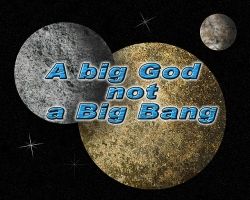
10. God Said
Genesis 1:1 says "In the beginning God"...not hydrogen
I saved this reason for last because many people believe creation or intelligent design are strictly religious positions on origins with no basis in science or the real world. What they really mean is that it's not an entirely naturalistic model of origins so it couldn't possibly be science. It runs counter to the worldview of those who have adopted the belief systems of naturalism or materialism. However, for those still with an open mind, I wanted to present a few science oriented reasons to believe in creation before I introduced God into the subject. I believe God is the only adequate first cause for the effect we know as the universe and life within it. When we look at the data (physics and fossils) relating to origins and, if we are allowed to follow the evidence where it leads rather than restrict our interpretations to the religions of naturalism or materialism, creation is an inescapable conclusion.
I regret that when I believed in evolution, the fact that the Bible said God was the creator wasn't sufficient for me. I felt that if God was the Creator, He must have used evolution to create. I had never looked at the data from a non-evolutionary mindset and it took several years of reading books by scientists who were creationists for me to evolve into a creationist. Today I regret that I didn't take God at His Word. I offer this article for those of you who may be at some point along a path similar to my journey from evolutionist to creationist.
For those of you who can say "God said it and that settles it for me." I say good for you. But you should prepare yourself to defend that position in our evolutionized culture.
For more information, read this.
Summary - 10 Reasons to be a Creationist
- Cause and effect
- Thermodynamics
- Law of biogenesis
- Probability
- Fossil record
- Information theory
- Origin of life
- Naturalism and materialism are not science
- Mutation-selection inaqdequate for evolution
- God said
Creation Related Websites
Below are some links to creation-related websites to help you in your personal research. I've included some intelligent design sights as well as Biblical creation sites. You will find articles and books written by scientists and scholars on a wide variety to topics. Use these links to explore the topics discussed in this article.
- The Institute For Creation Research
A scientific and Biblical site. - Answers In Genesis
A scientific and Biblical site. - Access Research Network
An intelligent design site. - Discovery Institute
An intelligent design site. - Christian Answers.net - Creation SuperLibrary
A scientific and Biblical site. - The Creation Research Society
A scientific and Biblical site.

![Expelled: No Intelligence Allowed [DVD]](https://m.media-amazon.com/images/I/41sj9fUmS+L._SL160_.jpg)




